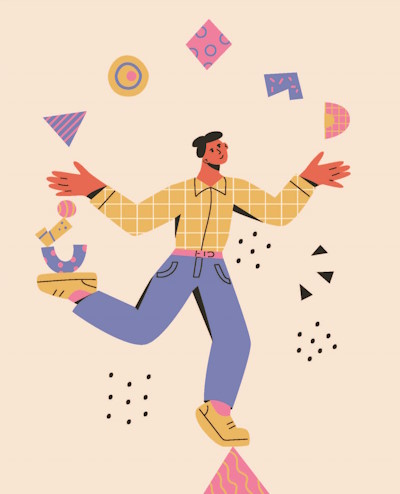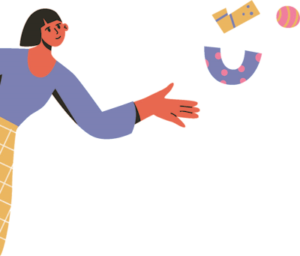Can You Really Multitask?
Attention Magazine August 2023
Doing Too Much at Once Is Less Productive
 Are you still trying to multitask?
Are you still trying to multitask?
Despite popular belief, we humans can’t really multitask. Instead, what we are actually doing is “task switching.” We may be making the switch rapidly among several tasks, but our brains, even those brains affected by ADHD, can only process one thought or task at a time.
A group of Stanford University researchers decided to measure the effects of chronic multitasking on our brains and in our lives. They found that multitasking actually makes people less effective at their work and impairs their decision-making abilities. Most of the multitaskers experienced greater stress, which negatively affected their health and social lives.
There was one group of people in the study who didn’t experience additional stress when multitasking, however: adults diagnosed with ADHD. Nevertheless, they showed significant dips in productivity and decision-making.
Bombarded by digital messages
During the late 1990s and 2000s, there was a growing interest in multitasking—do more, accomplish more, be more productive by simply working on more than one thing at a time. After all, if you can fold laundry and watch TV or read a book while music plays, why not also send emails, skim the daily news, and carry on a conversation?
A lot has changed in twenty years, though. We’ve added more digital media, social media, and electronic devices, bringing us more and more information. With the ability to access email or answer a work phone number from anywhere, the lines between home life and work life are increasingly blurred. Being connected, multitasking, and the appearance of “crazy-busy” all seem to have become popular badges of honor.
Adults with ADHD tend to struggle with inattention. They seek novelty and stimulating experiences. For them, task-switching is natural, as the brain looks for something new or exciting or at least not what it typically does. For them, working on two or three projects at a time seems to make sense. Social media has constant updates on friends and popular topics. Their brains become accustomed to the jolt of energy each new post, tweet, or news article seems to bring.
Should anyone be multitasking?
The Stanford researchers followed a group of multitaskers who used multimedia and social media while working on other tasks. The participants were separated into “high media multitaskers” and “low media multitaskers.”
The people who were low media multitaskers—who had fewer interruptions and less use of digital media—were better able to stay on task and maintain focus on a single task, despite distractions introduced by the researchers.
The high media multitaskers showed the opposite behaviors—they were more likely to respond to distractions and go off task into other activities. According to the researchers, high media multitaskers “may be sacrificing performance on the primary task to let in other sources of information.”
A separate study, “Multitasking in Adults with ADHD,” put the theory of multitasking to the test. The authors compared task performance, mood, and motivation in forty-five men diagnosed with ADHD and forty-two men who did not have a diagnosis. Both groups were measured on how well they completed tasks: multitasking, tasks subject to interruption that had to be completed without planning or monitoring, and uninterrupted tasks. The goal was to create a multitasking situation that included portions of several tasks being completed at different times, rather than one task completed all at once.
The results of their multitasking differed from what the Stanford researchers found: People diagnosed with ADHD were no better or worse at multitasking, but they were less likely to be stressed out by interruption and maintained a more positive outlook about their work, even when interrupted, than those not diagnosed with ADHD.
Multitasking and the ADHD brain
“The frequent multitaskers performed worse because they had more trouble organizing their thoughts and filtering out irrelevant information, and they were slower at switching from one task to another,” writes Travis Bradberry, PhD, referring to the Stanford study. “Multitasking reduces your efficiency and performance because your brain can only focus on one thing at a time. When you try to do two things at once, your brain lacks the capacity to perform both tasks successfully,” he further concludes.
The Stanford researchers also found that the more people are interrupted, especially when novelty was involved, the shorter their attention spans become. A good number of those individuals then become “self interrupters” who begin to create their own interruptions, such as checking social media status updates frequently, and are drawn away from their tasks.
When a person also has ADHD, the tendency toward self-interruption is greater. Frequent self interruption, in turn, aggravates already existing ADHD symptoms. Researchers also estimate that it took, on average, twenty-three minutes to completely come back on task after an interruption. Working on multiple projects at once showed that a person’s brain doesn’t completely refocus on the task or multiple tasks when task-switching. This leads to reduced work performance, an increased number of errors, and poorer decision-making, the researchers found.
Avoid brain drain, get things done
 “As you work fiercely to keep all of the balls in the air, you forget what is really important to you in that moment,” writes Marla Cummins, author of ADD to Done: Beyond Stuck, Procrastination and Overwhelm. “You lose focus. Moreover, because there are so many transitions as you move back and forth between tasks, you need more time to complete a task because you don’t allow yourself enough time to become focused on one task.”
“As you work fiercely to keep all of the balls in the air, you forget what is really important to you in that moment,” writes Marla Cummins, author of ADD to Done: Beyond Stuck, Procrastination and Overwhelm. “You lose focus. Moreover, because there are so many transitions as you move back and forth between tasks, you need more time to complete a task because you don’t allow yourself enough time to become focused on one task.”
Cummins, an ADHD coach and productivity consultant, has clients who often claim to be “really good at multitasking,” she writes. “When I hear this from adults with ADHD, they usually mean that they have a lot of energy to keep on going,” she adds. “It usually does not mean working effectively and efficiently.”
What can you do to avoid multitasking and work on one project at a time to be more efficient? Cummins suggests trying the following strategies as an “antidote” to multitasking:
- Review your non-negotiable appointments (meetings, carpool, dinner, etc.) and prioritize what is most important.
- Mark target due dates on your task list or calendar.
- Decide which tasks to complete and which tasks to table, whether for the moment or indefinitely.
- Break down tasks and schedule work time for each part. Make the schedule visible in your tasks list or on your calendar to help you remember your intentions.
- Use a timer to remind yourself of when you need to transition between tasks. If you think you might forget where you are in a particular task, make notes for yourself before moving on; this will make it easier to resume working on the task later.
- Plan to take some time between tasks so you do not feel hurried between projects.
- Allow yourself to take time to adjust your plan when things do not go as expected.


 Karen Sampson Hoffman, MA, is CHADD’s director of marketing and the editor of ADHD Weekly, where an earlier version of this article appeared.
Karen Sampson Hoffman, MA, is CHADD’s director of marketing and the editor of ADHD Weekly, where an earlier version of this article appeared.